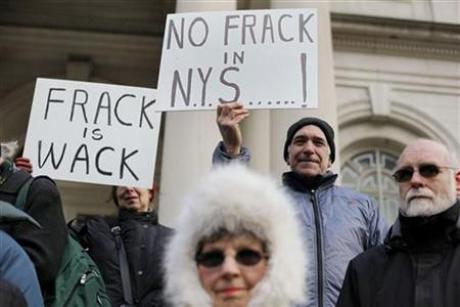Big Oil Seeks Shale Gas Deal In Climate Bill
Country: US
Author: Timothy Gardner

People gather on the steps of New York City Hall protesting the
states plan for shale oil drilling in the city's watershed in New
York January 4, 2010.
Photo: Shannon Stapleton
Three oil majors want U.S. senators crafting the climate bill to keep the federal government from regulating shale gas drilling methods that have made vast domestic reserves accessible but have been criticized for polluting water supplies.
Senators John Kerry, a Democrat, Lindsey Graham, a Republican, and Joseph Lieberman, an independent, are hoping to release an outline of the climate bill next month.
"Some of their staffers had asked the majors their views about what would be sensible in the climate bill," an industry source said.
In response, the companies submitted a document to the senators indicating they want states, not the federal government, to regulate hydraulic fracturing, or "fracking" for natural gas, according to the source.
The companies were ConocoPhillips, BP, and Shell Oil Co, the source said.
Hydraulic fracturing injects a mixture of water, sand and chemicals into rock formations to stimulate oil and natural gas production.
Kerry needs every vote he can get for the bill. Similar legislation has faced opposition from lawmakers in states whose economies depend heavily on fossil fuels.
An aide for Kerry said media reports were inaccurate in reporting that a draft of the bill included language that the states should remain the regulators of the drilling technique.
But another senate source said "the issue is still under discussion."
Exploitation of natural gas could allow the United States to reduce greenhouse gas emissions and cut its dependence on coal and perhaps petroleum imports if automakers build more cars to run on the fuel. When burned, natural gas emits only half of the carbon dioxide compared with coal, which power plants use to generate about half of U.S. electricity.
Critics, however, say the chemical fluids used can contaminate water supplies.
The Environmental Protection Agency said this month it will begin to study human health and environmental impacts of fracking fluids.
In addition, U.S. Representatives Maurice Hinchey and Dina DeGette have offered a bill that would reverse a measure by the George W. Bush administration that excluded fracking from regulation under the Safe Drinking Water Act.
TRADE SECRETS
The document submitted by the oil majors to the senators this week, labeled "Sense of the Senate Language," said states that regulate oil and gas "have the authority to and are best situated to continue regulating hydraulic fracturing processes and procedures," according to a copy obtained by Reuters.
It said those states should disclose the chemical composition of the fluids to doctors or state agencies when needed to protect human health or the environment, but to keep "the confidentiality of trade secrets information."
Shell and BP declined to comment on the document, and ConocoPhillips did not immediately return questions on it.
BP spokesman Scott Dean did say that the company supports the drilling. "Hydraulic fracturing is a proven safe technology. BP supports state regulation of because of the unique geology of states."
In addition, the wider oil industry would like to see expansions in offshore drilling in the bill.
Bruce Josten, a vice president at the Chamber of Commerce told reporters before entering a meeting with the senators on Thursday he understood that the offshore oil part of the bill would set up two levels for states to say whether they want to participate in expanded oil drilling.
The first would give states the opportunity to say whether they wanted to have new offshore oil drilling from their coasts up to 35 miles out.
A second level would let them veto drilling from 35 to 75 miles out, but Josten said this was still in discussion stages and he has not seen specific legislative language on any proposals.
(Additional reporting by Richard Cowan; Editing by John Picinich)
© Thomson Reuters 2010 All rights reserved
